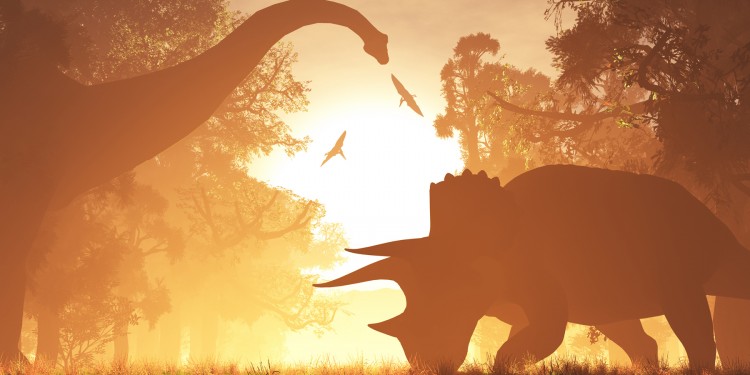
Dinosaurs died because of an asteroid impact
Was it volcanic eruptions in western India or an asteroid impact that caused the death of dinosaurs and many other animal species 66 million years ago? Researchers have been discussing this since the 1980s. An international research team led by Yale University in the USA and the Federal Institute for Geosciences and Natural Resources (BGR) in Hannover, Germany, has now presented evidence for the theory of the meteorite impact. Scientists from the University of Münster were also involved in the study, which was published in the journal "Science".
The discussion was based on various borehole samples - the most recent were taken during a deep-sea expedition of the Integrated Ocean Drilling Project in Newfoundland. These samples were examined in 2015 at the Institutes of Mineralogy and Planetology at Münster University for geochemical evidence of a meteorite impact. The scientists from Münster detected the so-called Iridium anomaly for the drill cores from Newfoundland, which was the first description for this locality This strong enrichment of the element iridium, which can be traced back to an asteroid impact 66 million years ago, confirmed by the discovery of the Chicxulub crater in Mexico in the early 1990s. The fact that the researchers were able to prove the impact of the meteorite at another location in the world added to the picture of the catastrophic global extend of the impact.
"Nevertheless, the question of the reason for the extinction could not be conclusively clarified, as people now began to discuss which of the two scenarios had the dominant effect on mass extinction," explains Dominik Loroch from the Institute of Mineralogy. He was involved in both the preliminary study 2016 and the current study in which 36 scientists from all over the world analysed all the data and approaches found so far. Among other things, they reconstructed the global temperatures at the time of extinction, studied fossil finds and models of the carbon cycle.
From their results, the researchers now concluded that the environmental impact of the massive volcanic eruptions in the Indian region of Deccan must have occurred long before the end of the Cretaceous period 66 million years ago and therefore could not have contributed to the mass extinction. "At least half of the gas eruptions at the Deccan volcano led to a brief warming phase about 200,000 years before the extinction event," says Dr. André Bornemann of the BGR in Hannover, one of the lead authors of the study. However, volcanism itself could still have had an impact on living organisms after the great extinction, for example in the form of tsunamis and bush fires.
First author Prof. Pincelli Hull from Yale University summarizes the results: “ A lot of people have speculated that volcanoes mattered to K-Pg, and we’re saying, ‘No, they didn’t.’”
Funding:
The Study received financial support by the National Science Foundation in the USA.
Original publication:
P. M. Hull et al (2020). On Impact and Volcanism across the Cretaceous-Paleogene Boundary. Science; DOI: 10.1126/science.aay5055
